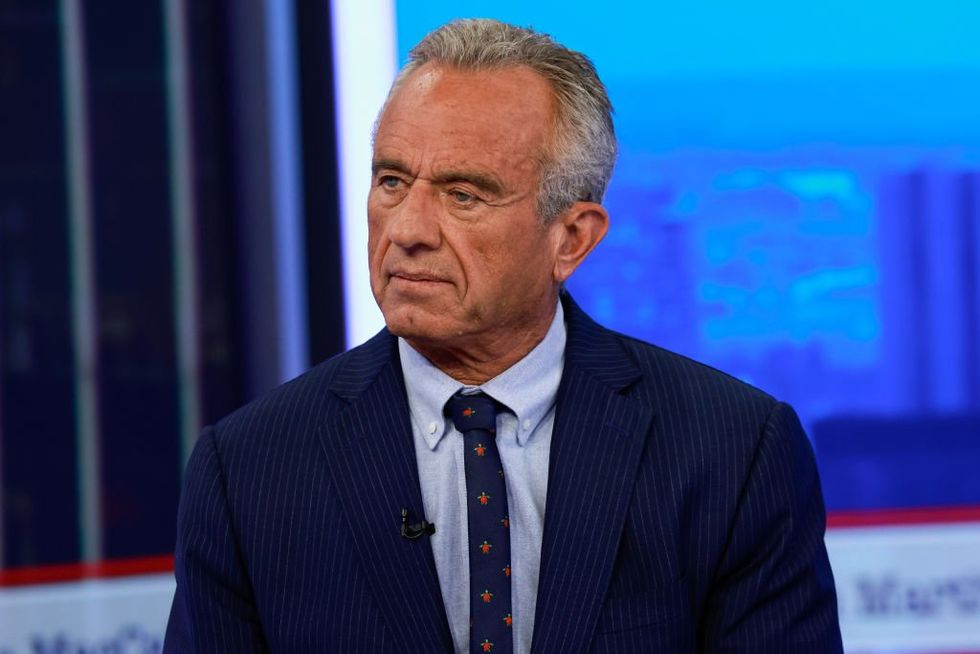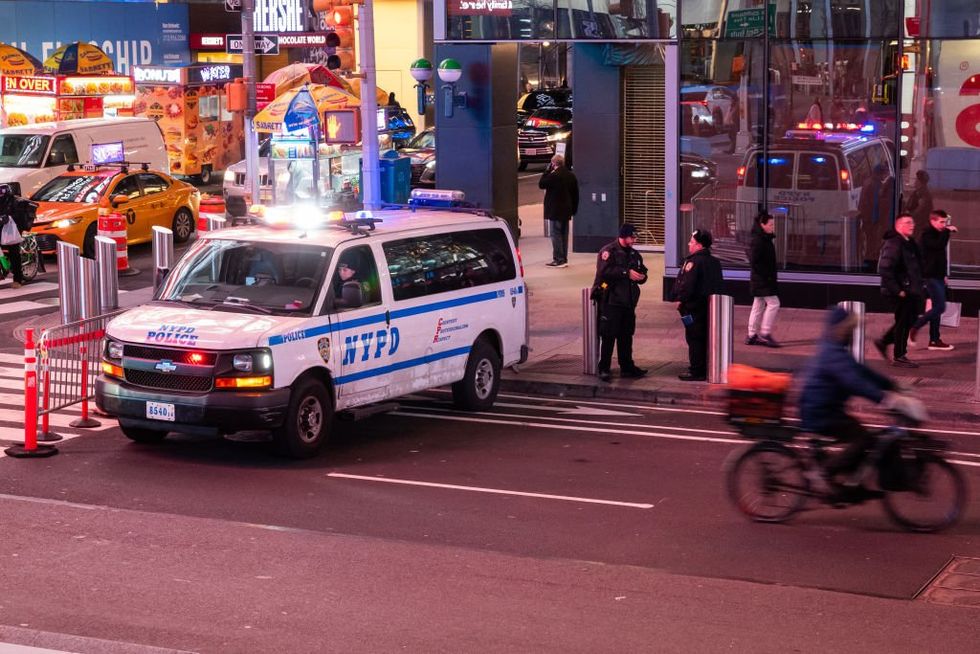'Very stupid': New York Times beclowns itself with botched 'fact-check,' proving RFK Jr.'s point
Robert F. Kennedy Jr., President-elect Donald Trump's proposed Health and Human Services secretary, has pledged to "Make America Healthy Again" primarily by tackling the "chronic disease epidemic" and the corporate capture of federal regulatory agencies. The environmental lawyer's adjacency to the Republican president and his recent criticism of experimental gene therapies have made him a frequent target for criticism by lawmaking recipients of Big Pharma lobbying money and the liberal media. In their efforts to dunk on Kennedy, establishmentarians have in many cases exposed their true loyalties as well as their aversion to inconvenient facts. The New York Times is now among the outfits that has risked such exposure in its desperation to characterize Kennedy as "wrong." 'The science shows that these dyes cause hyperactivity in children, can disrupt the immune system, and are contaminated with carcinogens.' By attempting to miss a point that Kennedy was making in a recent interview, the Times' Christina Jewett and Julie Creswell unwittingly defended his thesis. Critics have since descended upon the liberal publication, mocking it over its botched fact-check. At the outset of their article, titled "Kennedy’s Vow to Take On Big Food Could Alienate His New G.O.P. Allies," Jewett and Creswell wrote, "Boxes of brightly colored breakfast cereals, vivid orange Doritos and dazzling blue M&Ms may find themselves under attack in the new Trump administration." After highlighting why food titans that produce unhealthy products are "nervous" about the incoming administration, Jewett and Creswell tried nitpicking through some of Kennedy's concerns, zeroing in on his recent remarks about the ingredients of Kellogg's Froot Loops cereal. In September, Sen. Ron Johnson (R-Wisc.) moderated a four-hour round table discussion on Capitol Hill about American health and nutrition. During her presentation, Vani Hari, a critic of the food industry who founded FoodBabe, shared the ingredient lists for multiple food products in the U.S. versus in Europe and stressed the need for limits on additives and dyes in breakfast cereals. Together with Jason Karp, founder and CEO of the healthy living organization HumanCo., Hari highlighted the color difference between the Froot Loops cereal produced for American consumption and the version produced for consumption in Canada. The brighter artificial colors are more attractive to children — and helpful with sales — but apparently harmful to their health. Hari recently told Blaze News: The science shows that these dyes cause hyperactivity in children, can disrupt the immune system, and are contaminated with carcinogens. There are safer colors available made from fruits and vegetables, such as beets and carrots. Food companies already don't use artificial dyes en masse in Europe because they don’t want to slap warning labels on their products that say they 'may cause adverse effects on attention in children.' If food companies like Kellogg's can reformulate their products without artificial dyes to sell in other countries, there is no reason why they can’t do that also here in America. The food activist added, "As there are over 10,000 food additives approved for use in the United States, while Europe only allows 400, the [incoming] administration should prioritize taking control of the alarming amount of food additives in our food supply." 'This is of particular concern for fetuses and babies under the age of 6 months, whose blood-brain barrier is not fully developed.' Kennedy appeared on Fox News the following day and referenced Hari's presentation, saying, "A box of Froot Loops from Canada or from Europe ... has a completely different group of ingredients. It's actually colored with vegetable oils, which are safe. Ours are colored with chemical oils, which are very, very dangerous." Following the election, Kennedy revisited the example in a MSNBC interview, saying offhand, "Why do we have Froot Loops in this country that have 18 or 19 ingredients, and you go to Canada and it's got two or three?" The Times seized on Kennedy's critique of Froot Loop, writing: Mr. Kennedy has singled out Froot Loops as an example of a product with too many artificial ingredients, questioning why the Canadian version has fewer than the U.S. version. But he was wrong. The ingredient list is roughly the same, although Canada's has natural colorings made from blueberries and carrots while the U.S. product contains red dye 40, yellow 5 and blue 1 as well as Butylated hydroxytoluene, or BHT, a lab-made chemical that is used "for freshness," according to the ingredient label. In the same paragraph that the Times claimed Kennedy was wrong about Froot Loops having more artificial ingredients in Canada than in the U.S., the liberal publication effectively pointed out he was right on the money. According to the National Library of Medicine, butylated hydroxytoluene


Robert F. Kennedy Jr., President-elect Donald Trump's proposed Health and Human Services secretary, has pledged to "Make America Healthy Again" primarily by tackling the "chronic disease epidemic" and the corporate capture of federal regulatory agencies.
The environmental lawyer's adjacency to the Republican president and his recent criticism of experimental gene therapies have made him a frequent target for criticism by lawmaking recipients of Big Pharma lobbying money and the liberal media. In their efforts to dunk on Kennedy, establishmentarians have in many cases exposed their true loyalties as well as their aversion to inconvenient facts.
The New York Times is now among the outfits that has risked such exposure in its desperation to characterize Kennedy as "wrong."
'The science shows that these dyes cause hyperactivity in children, can disrupt the immune system, and are contaminated with carcinogens.'
By attempting to miss a point that Kennedy was making in a recent interview, the Times' Christina Jewett and Julie Creswell unwittingly defended his thesis. Critics have since descended upon the liberal publication, mocking it over its botched fact-check.
At the outset of their article, titled "Kennedy’s Vow to Take On Big Food Could Alienate His New G.O.P. Allies," Jewett and Creswell wrote, "Boxes of brightly colored breakfast cereals, vivid orange Doritos and dazzling blue M&Ms may find themselves under attack in the new Trump administration."
After highlighting why food titans that produce unhealthy products are "nervous" about the incoming administration, Jewett and Creswell tried nitpicking through some of Kennedy's concerns, zeroing in on his recent remarks about the ingredients of Kellogg's Froot Loops cereal.
In September, Sen. Ron Johnson (R-Wisc.) moderated a four-hour round table discussion on Capitol Hill about American health and nutrition.
During her presentation, Vani Hari, a critic of the food industry who founded FoodBabe, shared the ingredient lists for multiple food products in the U.S. versus in Europe and stressed the need for limits on additives and dyes in breakfast cereals.
Together with Jason Karp, founder and CEO of the healthy living organization HumanCo., Hari highlighted the color difference between the Froot Loops cereal produced for American consumption and the version produced for consumption in Canada.
The brighter artificial colors are more attractive to children — and helpful with sales — but apparently harmful to their health.
Hari recently told Blaze News:
The science shows that these dyes cause hyperactivity in children, can disrupt the immune system, and are contaminated with carcinogens. There are safer colors available made from fruits and vegetables, such as beets and carrots. Food companies already don't use artificial dyes en masse in Europe because they don’t want to slap warning labels on their products that say they 'may cause adverse effects on attention in children.' If food companies like Kellogg's can reformulate their products without artificial dyes to sell in other countries, there is no reason why they can’t do that also here in America.
The food activist added, "As there are over 10,000 food additives approved for use in the United States, while Europe only allows 400, the [incoming] administration should prioritize taking control of the alarming amount of food additives in our food supply."
'This is of particular concern for fetuses and babies under the age of 6 months, whose blood-brain barrier is not fully developed.'
Kennedy appeared on Fox News the following day and referenced Hari's presentation, saying, "A box of Froot Loops from Canada or from Europe ... has a completely different group of ingredients. It's actually colored with vegetable oils, which are safe. Ours are colored with chemical oils, which are very, very dangerous."
Following the election, Kennedy revisited the example in a MSNBC interview, saying offhand, "Why do we have Froot Loops in this country that have 18 or 19 ingredients, and you go to Canada and it's got two or three?"
The Times seized on Kennedy's critique of Froot Loop, writing:
Mr. Kennedy has singled out Froot Loops as an example of a product with too many artificial ingredients, questioning why the Canadian version has fewer than the U.S. version. But he was wrong. The ingredient list is roughly the same, although Canada's has natural colorings made from blueberries and carrots while the U.S. product contains red dye 40, yellow 5 and blue 1 as well as Butylated hydroxytoluene, or BHT, a lab-made chemical that is used "for freshness," according to the ingredient label.
In the same paragraph that the Times claimed Kennedy was wrong about Froot Loops having more artificial ingredients in Canada than in the U.S., the liberal publication effectively pointed out he was right on the money.
According to the National Library of Medicine, butylated hydroxytoluene — used as a preservative in fats and oils as well as in packaging material for fat-containing foods — has been shown in animal studies to increase serum cholesterol, reduce growth in baby rats, and increase absolute liver weight. The NLM and the Canadian government also recognize BHT as harmful to the environment.
Red dye 40 is made from petroleum and has been approved by the FDA for use in food and drinks. It has been linked in some studies to hyperactivity disorders in children. The Cleveland Clinic indicated that red dye 40 also has various potential side effects, including depression, irritability, and migraines.
Yellow dye 5 or tartazine is another synthetic food colorant linked to numerous adverse health effects. It is reportedly restricted in Austria and Norway owing to the allergies, asthma, skin rashes, hyperactivity, and migraines it can apparently cause.
A 2021 paper in the peer-reviewed journal Advances in Nutrition noted that blue dye 1 has been found to cause chromosomal aberrations and "was found to inhibit neurite growth and act synergistically with L-glutamic acid in vitro, suggesting the potential for neurotoxicity. This is of particular concern for fetuses and babies under the age of 6 months, whose blood-brain barrier is not fully developed."
'This is beyond absurd.'
The paper noted further that having found blue dye 1 to have cytotoxic and genotoxic effects, some researchers "advise that caution must be exercised when using it for coloring food."
Children are the biggest consumers of such artificial food dyes.
Critics blasted the Times over its bizarre "fact-check," which said he was wrong then unwittingly explained why he was right.
"This is what passes for a 'fact check' at The New York Times," wrote Turning Point USA founder Charlie Kirk. "The media lie a lot, but fortunately for us, they are also VERY stupid."
"Americans are being poisoned under the status quo food and health institutions, and regime media wants you to believe that Bobby Kennedy pushing for reform is somehow the problem. Make it make sense!" added Kirk.
Molecular biologist Dr. Richard H. Ebright of Rutgers University tweeted, "I read the paragraph multiple times yesterday, trying to make sense of what the idiot writer had written. I could only conclude that the idiot writer had written the equivalent of '2 + 2 = 5.'"
One critic quipped, "'As you see, the ingredient list is just completely identical, except the US product contains formaldehyde, cyanide, and nearly undetectable levels of saxitoxin."
"Crazy," tweeted Elon Musk.
Pershing Square Capital Management founder Bill Ackman wrote, "This is beyond absurd. The @nytimes says @RobertKennedyJr 'was wrong' about Froot Loops having too many artificial ingredients compared to its Canadian version, and then goes on to explain the artificial colorings and preservatives in the U.S. vs the Canadian version. @RobertKennedyJr is right and The NY Times is an embarrassment."
Texas Sen. Ted Cruz (R) noted, "In their defense, their comedy writers are really strong."
The Times has since blamed an "editing error" and rewritten its Orwellian paragraph to read:
Mr. Kennedy has singled out Froot Loops as an example of a product with too many ingredients. In an interview with MSNBC on Nov. 6, he questioned the overall ingredient count: 'Why do we have Froot Loops in this country that have 18 or 19 ingredients and you go to Canada and it has two or three?' Mr. Kennedy asked. He was wrong on the ingredient count, they are roughly the same. But the Canadian version does have natural colorings made from blueberries and carrots while the U.S. product contains red dye 40, yellow 5 and blue 1 as well as Butylated hydroxytoluene, or BHT, a lab-made chemical that is used 'for freshness, according to the ingredient label.
The New York Times' credibility has taken a massive hit in recent months and years. After all, it was an exponent of the Russian collusion hoax; falsely claimed Trump supporters killed U.S. Capitol Police Officer Brian Sicknick with a fire extinguisher; falsely reported on the basis of terrorist propaganda that Israel blew up a Gazan hospital; and suggested that the Babylon Bee, a satire website, was a "far-right misinformation site."
Despite its trouble getting the facts right, it recently teamed up with Media Matters to get BlazeTV hosts censored, citing concerns over "misinformation."
Like Blaze News? Bypass the censors, sign up for our newsletters, and get stories like this direct to your inbox. Sign up here!
Originally Published at Daily Wire, World Net Daily, or The Blaze
What's Your Reaction?

































































































